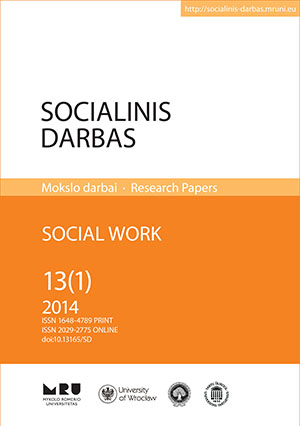Vaiko-tėvų santykių sąsajos su pozityvios jaunimo raidos komponentais
Child-Parent Relationships and Positive Youth Development Components
Author(s): Goda Kaniušonytė, Inga Truskauskaitė-Kunevičienė, Oksana MalinauskienėSubject(s): Social Sciences
Published by: Mykolas Romeris University
Keywords: Positive Youth Development; parental rearing style; parent attachment; parent psychological control; parental monitoring; communication with parents
Summary/Abstract: Positive youth development (PYD) is a strengths-based model that recognizes importance of an individual’s and his or her environment’s connectivity and how those relationships shape human development (Benson and Saito, 2000; Benson, 2003; Lerner 2005; Fredricks and Eccles, 2008; Chand et al., 2013). The literature has distinguished five positive youth development components (called Five C’s) stimulating positive results. Those components are competence, confidence, connection, character, and caring (Lerner 2005, Lerner et al., 2005; Roth and Brooks-Gunn, 2003). Along with the great importance of individual characteristics of the adolescent, the positive youth developmental model emphasizes the particular importance of family context and parent-child relationships (Lerner et al., 2005; Chand et al., 2013). Family and parenting factors that are important for positive adolescent outcomes include low levels of parent-adolescent conflict (McElhaney et al., 2009), parental warmth (Nash et al., 2005; Napolitano et al., 2011), positive communication (Hillaker et al., 2008) and parental monitoring (Kerr and Statt, 2000; Kerr et al., 2010; Napolitano et al., 2011). In view of the PYD research context, family context is given very little attention (Chand et al., 2013). Most of the available data has been received from the studies in the United States, while the data in European, especially in Eastern European, countries is very scarce. This study aims to investigate the relationship between family context and positive youth development components (the Five C’s). The data used is from an ongoing longitudinal Positive Youth Development study, which is funded by the European Social Fund under the Global Grant measure. Student participants were drawn from five high schools in the administrative region of Utena, Lithuania (9-12 grades). 1787 students participated in the first assessment (47.4% were boys and 52.6% were girls, aged 14-22 years (M=16.62, SD=1.24)), which took place in spring, 2013. For this current study, only the participants who completely filled the PYD and children-parents relationship questionnaires (N=1727) were included. The results in the Lithuanian sample revealed similar tendencies as in the United States, European and some other countires. The results showed that parental monitoring, trust, emotional warmth, absence of alienation and communication with parents are strongly positively related with all five positive youth development components (the Five C’s), whereas psychological control and rejection are negatively related with the Five C’s.
Journal: Socialinis darbas
- Issue Year: 13/2014
- Issue No: 1
- Page Range: 98-109
- Page Count: 12
- Language: Lithuanian

